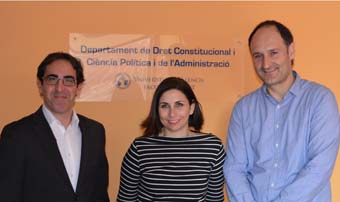
The decentralisation proposals of Podemos would drag to the purple organization the electorate who is dissatisfied with centralism, especially the PSOE voters. However, to defend great levels of regional autonomy could create conflicts among territories and could reduce the capacity of negotiation at the state level. This is the contribution of three Political Science teachers from the UV who highlight in an article published in the magazine ‘South European Society and Politics’ that to defend a bigger decentralisation will benefit Podemos
The possibility of Podemos of spreading even more among the Spanish moderate electorate which already represents one out of three voters of the purple organization is a fact. This is one of the conclusions of the article that puts forward the devolution of powers to the autonomous regions is one of the strongest pillars of identification of all the electorate with Podemos and it can mean a transfer of votes to the party if it bets on a greater decentralisation. PSOE would be the most harmed organization with this approach.
The article Fast and Furious: Podemos Quest for Power in Multi-level Spain, published in the magazine South European Society and Politics is popular again as a result of the congress of the purple organization Vistalegre II this weekend. The research of the experts of the UV underlines that the Spanish electorate continues thinking that the purple organization is a far-left party despite the process of moderation produced since the European elections of 2014 until the General ones in 2016. The publication also announces that the debate at the heart of Podemos is to consolidate the leftist voters or to broaden the political space towards the centre. This dilemma has been initially solved in Vistalegre II.
'The main contribution of our work is a paradox. One of the main factors that explains the growth of Podemos is the position as for the rupture centre/periphery propitious to decentralisation or even to the exercise of the right of self-determination in Catalonia. This position can become a source of conflict and limit the growth’, have underlined Juan Rodríguez Teruel, Astrid Barrio and Óscar Barberà who are the authors of the article that has become in just over three months the 11st most widely read article of the magazine.
The published work analyses the evolution, the strengths and the weaknesses of the purple organization, as well as the changeable perception of the electorate, both the typical and the external. According to researchers, Podemos deals with the dilemma that can emerge among the social demands and the territorial recognitions. ‘In this regard, the article highlights that one of the most important challenges of Podemos is the adaptation of its proposals to the different identity feelings of the nation as well as the degree of commitment which is willing to accept in regional initiatives such as the Catalonian referendum’, affirms Rodríguez Teruel.
The three researchers highlight that there are different views when it comes to defend the devolution of powers and this fact can produce conflicts in the purple party. ‘It could empower the determination of the regional allies of Podemos when the times come to building independent political organizations rather than joining together as regional branches.’ According to experts, it could also happen that there were ‘contradictions’ between the social policies and the devolution of economic powers because the regional imbalances could increase.
GREPP
Juan Rodríguez Teruel, Astrid Barrio and Óscar Barberà are members of the Research Group of Elites and Political Parties (GREPP). The team has been studying for more than 15 years the relationship between the political parties and its electorate through surveys to the members in matters relating to the organization, the funding and the internal processes, among others. The members of GREPP are part of several international research networks such as Members and Activists of Political Parties (MAPP) or Selection and Deselection of Political Elites (SEDEPE). The have published the result of their researches in national and international prestigious magazines such as South European Society and Politics, Ethnic and Racial Studies, Acta Politica or Comparative Sociology, among others.
Article:
Juan Rodríguez-Teruel, Astrid Barrio & Óscar Barberà. “Fast and Furious: Podemos’ Quest for Power in Multi-level Spain”. South European Society and Politics, 21, 2016. Doi: 10.1080/13608746.2016.1250397
Url: http://dx.doi.org/10.1080/13608746.2016.1250397
Last update: 16 de february de 2017 11:28.
News release



















